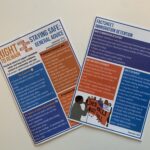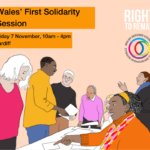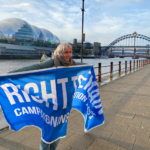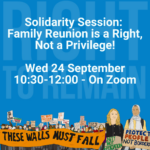Campaign by Women Against Rape.
 Noela Claye suffered horrific rape and other violence in 1995 in Sierra Leone during the civil war. In November 2013 she won the right to stay in the UK. Having already endured so much, Ms Claye was then faced with the unceasing cruelty and inhumanity of the UK Home Office, who attempted to appeal the decision to grant her the right to remain.
Noela Claye suffered horrific rape and other violence in 1995 in Sierra Leone during the civil war. In November 2013 she won the right to stay in the UK. Having already endured so much, Ms Claye was then faced with the unceasing cruelty and inhumanity of the UK Home Office, who attempted to appeal the decision to grant her the right to remain.
Ms Claye heard she had won when she went to court on 2 May for a “case management review”. Instead the Judge ruled there and then that the Home Office had failed to take into account what Ms Claye had suffered, and granted her Indefinite Leave to Remain in the UK.
Community Support
Ms Claye was supported by Women Against Rape, who enabled Ms Claye to speak about her traumatic experiences and gave evidence in court on her behalf.
Ms Claye has also spoken to large crowds at demonstrations against legal aid cuts, speaking out against the cuts.
After hearing the judge’s decision, Ms Claye said:
I could not have won my case without all the kind support I received from my friends, family, women from WAR, the public and from lawyers who worked for free after I was refused legal aid. During this time, I was also caring for my niece, a mother of two, who was suffering from breast cancer. She passed away on Mother’s Day which has caused us so much shock. I feel that what the Home Office put me through hastened her death. I must now keep a steady head and take care of her precious children to try to bring love and happiness into their lives.
Travesties of justice
Women Against Rape have outlined the many barriers Ms Claye faced in securing justice and the right to remain in the UK, including:
- In her first appeal, the Home Office Presenting Officer mercilessly interrogated Ms Claye and accused her of lying to the point that Ms Claye broke down in tears. Many women describe this experience as the second rape and as equally traumatising as the actual assault. Thankfully Ms Claye had the backing of the All African Women’s Group and WAR, and won.
- Unbelievably the Home Office appealed. A second judge allowed the appeal to proceed by wrongly stating that there had been doubts about Ms Claye’s account of rape. Ms Claye faced months more insecurity, the terror of being returned, the prospect of going through another court case and recounting details of rape again.
- Due to the legal aid cuts, and Ms Claye’s case being an ‘immigration’ matter not an ‘asylum’ matter, she was not entitled to legal aid funding unless she could successfully apply for exceptional funding
- Ms Claye, whose first language isn’t English, was expected to show that she is too traumatised or ill to represent herself, that her case was too legally complex by addressing detailed legal points and precedents – clearly impossible. In a terrible “Catch 22” situation, she needed a lawyer to apply for lawyer
- For Women Against Rape, the campaign isn’t over. They will be helping Ms Claye to make formal complaints against the Home Office presenting officer and the second judge, for their hostile and abusive treatment of Ms Claye and for flouting “Gender Guidelines” to protect victims’ rights.
















Discussion: